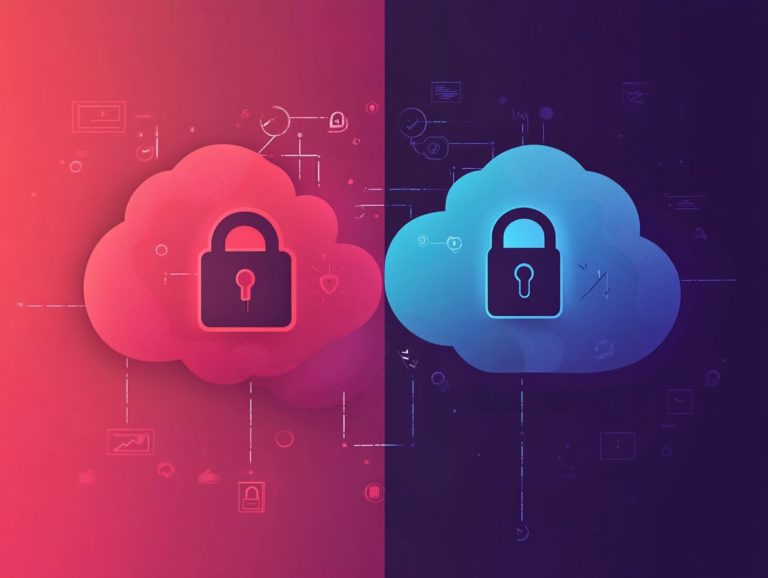5 tips for choosing managed security services
In today s digital landscape, protecting your business from cyber threats has never been more crucial.
Selecting the right managed security services can feel daunting, but it doesn t have to be. This article provides five essential tips to help you evaluate your security needs, research potential providers, and grasp key contract terms.
It also delves into the benefits of managed security services, illustrating how they assist with compliance while highlighting common pitfalls to steer clear of.
Whether you run a small business or oversee a large enterprise, these insights will empower you to make informed decisions that significantly enhance your security posture.
Contents
- Key Takeaways:
- 1. Assess Your Security Needs
- 2. Research and Compare Different Providers
- 3. Consider the Provider’s Reputation and Experience
- 4. Evaluate the Level of Support Offered
- 5. Review and Understand the Contract Terms
- What Are Managed Security Services and How Do They Work?
- What Are the Benefits of Using Managed Security Services?
- What Are the Different Types of Managed Security Services?
- How Can Managed Security Services Help with Compliance?
- What Are the Common Mistakes to Avoid When Choosing Managed Security Services?
- How Can a Business Measure the Effectiveness of Managed Security Services?
Key Takeaways:

Assess your security needs carefully before choosing a managed security service provider. To ensure you make an informed decision, consider reviewing the best practices for implementing managed security services. Do thorough research and compare different providers to find the best fit for your business. Consider the reputation and experience of the provider, as well as the level of support offered.
1. Assess Your Security Needs
Start by assessing your security needs. This vital first step will protect your business from threats.
It empowers you to identify vulnerabilities and develop a comprehensive security strategy that includes preventive protection, incident management, and compliance with industry standards such as GDPR and ISO.
This assessment will reveal specific weaknesses in your current systems. It will also offer insights into potential threats that could jeopardize sensitive data.
By employing structured risk assessment methodologies, you can systematically pinpoint cybersecurity threats, whether they arise from external hacking attempts, insider threats, or even natural disasters.
The process underscores the importance of managing weaknesses, ensuring that you regularly evaluate and patch your systems to minimize entry points for attackers.
For instance, you might encounter challenges like securing the ever-expanding IoT devices within your networks or addressing compliance gaps that leave customer data vulnerable.
Ultimately, this thorough analysis shapes your organization s overall security posture, crafting a resilient framework that adapts to ever-evolving threats.
2. Research and Compare Different Providers
Researching and comparing different Managed Security Service Providers (MSSPs) is crucial for you if you’re seeking flexible and scalable solutions to enhance your cybersecurity posture while ensuring continuous protection against emerging threats. Understanding how 5 ways managed security services can lower costs can also help you make an informed decision.
To make a well-informed selection, evaluate various criteria, such as the range of service offerings and refer to guidelines on how to assess your needs for managed security services to understand the sophistication of the security operations center capabilities.
Customizing solutions plays a significant role in your ability to address unique security challenges effectively. Don’t overlook the importance of reviewing service level agreements (SLAs) and analyzing client testimonials; these can offer valuable insights into each MSSP’s effectiveness, helping you avoid common pitfalls in managed security services.
By examining case studies that showcase successful partnerships, you can gain a clearer understanding of which providers have a proven track record in delivering tailored and comprehensive security solutions.
3. Consider the Provider’s Reputation and Experience

When selecting an MSSP, it’s crucial for you to consider the provider’s reputation and experience. An established provider, armed with industry knowledge and a skilled expert team, can significantly bolster your organization’s security measures. Additionally, learning how to optimize your managed security service experience can further enhance your security efforts and compliance monitoring.
Evaluating their track record offers valuable insights into how effectively they ve addressed past security challenges. Client testimonials provide you with firsthand accounts of their reliability and service quality.
Industry certifications like NIST and CMMC show a provider’s commitment to adhering to stringent security standards. Together, these factors highlight the provider’s depth of experience and enhance their ability to identify vulnerabilities and respond promptly when threats arise, ensuring your organization remains resilient in an ever-evolving digital landscape.
4. Evaluate the Level of Support Offered
Evaluating the level of support offered by a Managed Security Service Provider (MSSP), a company that handles your security needs, ensuring your digital environment is safe, is essential for ensuring your organization receives timely incident management, employee awareness training, and expert guidance tailored to your unique cybersecurity needs.
A reliable MSSP should undoubtedly offer continuous 24/7 monitoring. This enables them to identify and respond to threats in real-time. This proactive stance is crucial for minimizing potential damage and ensuring a swift recovery from incidents.
Well-defined incident response plans must be in place. These allow for an organized and effective reaction when security issues arise. Comprehensive employee training programs are vital to enhancing awareness and empowering your staff to recognize potential threats, ultimately creating a knowledgeable team.
Technical expertise is crucial. Professionals skilled in advanced security techniques are necessary to navigate and address the ever-evolving landscape of security challenges efficiently.
5. Review and Understand the Contract Terms
Reviewing and fully grasping the contract terms, including service level agreements (SLAs) and compliance monitoring requirements, is vital for ensuring that your MSSP aligns perfectly with your organization s security goals and risk mitigation strategies.
Taking a closer look at the key components of MSSP contracts helps you clarify expectations and cultivate fruitful partnerships.
Essential factors to keep in mind include:
- A clearly defined scope of services, which details the security measures that will be implemented and the methods they’ll employ.
- Evaluating the reporting frequency; regular updates on your security posture empower you to make informed decisions.
- Understanding the penalties for non-compliance, as these can shield you from inadequate service.
Transparency in SLAs not only fosters trust but also aligns security frameworks with broader organizational objectives, creating a cohesive safety net against potential threats.
What Are Managed Security Services and How Do They Work?

Managed Security Services (MSS) offer you a robust cybersecurity solution, expertly provided by third-party vendors known as Managed Security Service Providers (MSSPs). These providers harness advanced technologies and skilled teams to deliver continuous threat detection, data protection, and proactive response capabilities through their dedicated security operations centers.
These services are key to keeping your organization safe from the constantly evolving landscape of cyber threats. MSSPs utilize cutting-edge technologies, including deep learning algorithms and sophisticated malware detection systems, to pinpoint vulnerabilities and potential attacks before they can cause harm.
By employing a comprehensive suite of methodologies, such as threat intelligence analytics and behavioral monitoring, MSSPs grant you real-time insights into security incidents. This proactive approach boosts your security and ensures you respond faster to threats! As a result, you can focus on your core operations while enjoying peace of mind in your digital environment.
What Are the Benefits of Using Managed Security Services?
Utilizing Managed Security Services (MSS) presents a wealth of advantages for you, including enhanced compliance monitoring, efficient incident management, and improved employee awareness training. To learn more about implementing these benefits, check out this guide on how to transition to managed security services. All of these work together to strengthen your organization’s cybersecurity posture against ever-evolving threats.
These services methodically elevate your security framework by incorporating advanced technologies and real-time threat intelligence. This integration not only empowers you to detect and respond to incidents more swiftly but also significantly reduces vulnerabilities. For example, companies that have embraced MSS often report a substantial decrease in third-party risks.
Providers tend to conduct thorough assessments and continuous monitoring of vendors, promoting a more secure supply chain. Imagine a multinational retail chain that improved its cybersecurity by cutting incident response times by over 50%! This incredible result showcases the power of Managed Security Services and fosters a culture of security awareness among employees.
What Are the Different Types of Managed Security Services?
Managed Security Services encompass a range of offerings designed to strengthen your organization against various cybersecurity threats. This includes everything from endpoint security to proactive protection, all expertly coordinated through a dedicated security operations center.
These services work together to establish strong security measures for your business. For instance, endpoint security focuses on safeguarding individual devices. Vulnerability management is about identifying and addressing weaknesses throughout your network.
Integrating threat intelligence keeps you informed about emerging risks. This enables timely and effective responses. By harnessing these interconnected services, you can significantly enhance your resilience against cyberattacks.
This approach not only streamlines your security efforts but also fosters a proactive culture. It ensures your organization is well-prepared for the ever-evolving landscape of cybersecurity challenges.
How Can Managed Security Services Help with Compliance?

Managed Security Services are essential in helping you adhere to data protection regulations and compliance standards. They provide expert guidance, robust monitoring, and effective security measures tailored to your industry s requirements.
These services cover a broad spectrum of offerings, including:
- Thorough audits that assess your current security posture
- Detailed reports highlighting vulnerabilities
- Ongoing training that empower your employees to identify and mitigate risks
By aligning your strategies with critical frameworks like GDPR, ISO, and NIST, MSSPs enable you to streamline your compliance efforts. They ensure that your practices not only meet evolving standards but also provide practical solutions for navigating complex regulatory landscapes.
This support can truly ease your compliance burden, allowing you to focus on what matters most!
What Are the Common Mistakes to Avoid When Choosing Managed Security Services?
Choosing Managed Security Services (MSS) can be tricky. It’s easy to fall into common traps that could undermine your cybersecurity efforts, but learning how to evaluate managed security services effectively can help you make informed decisions.
Many organizations make hasty choices without fully understanding their unique security needs. This can result in a misalignment between business objectives and the offerings of their chosen service provider.
To sidestep these pitfalls, it’s essential to conduct thorough research. Explore multiple MSSP options and check out what to expect from managed security services while seeking out client testimonials.
By establishing clear expectations from the start defining specific security needs and measurable outcomes you can foster a productive partnership.
Ultimately, a well-aligned security strategy ensures that your cybersecurity measures complement your overall business objectives, enhancing your resilience in today s intricate threat landscape.
For further insights and assistance, consider consulting an expert in Managed Security Services.
How Can a Business Measure the Effectiveness of Managed Security Services?
Measuring the effectiveness of Managed Security Services (MSS) is essential to ensure your organization meets its cybersecurity objectives. This can be achieved through periodic reports, vigilant threat monitoring, and a complete review of your security setup.
By utilizing key performance indicators (KPIs) such as incident response time, threat detection rates, and vulnerability management efficiency, you can gain invaluable insights into how well your security strategy is performing. For example, tracking the average response time to security incidents helps pinpoint areas that need improvement.
Regularly reviewing these metrics reveals trends that help forecast future risks and allocate resources effectively. Such insights are vital in shaping your strategic planning, empowering your organization to proactively adapt its cybersecurity approaches and stay ahead of ever-evolving threats.
Frequently Asked Questions
What exactly are managed security services?
Managed security services refer to a third-party provider that manages and monitors an organization’s security systems and infrastructure. This includes tasks such as threat detection, incident response, and vulnerability management.
Why should I consider using managed security services?
Managed security services offer incredible benefits that can transform your security approach, including 24/7 monitoring and support, access to advanced security tools and technologies, and cost savings compared to in-house security teams.
What are the key factors to consider when choosing a managed security services provider?
When selecting a managed security services provider, consider their experience and expertise, the services and technologies they offer, their certifications and compliance standards, and their level of customer support. Additionally, be sure to review the key features of effective managed security services they provide.
What are the top 5 tips for choosing managed security services?
- Determine your organization’s specific security needs and requirements.
- Research and compare multiple managed security services providers.
- Consider the provider’s experience, expertise, and reputation in the industry.
- Evaluate the services and technologies they offer to ensure they meet your needs.
- Ask about their certifications and compliance standards, as well as their level of customer support.
How can managed security services help improve my organization’s security posture?
Managed security services can enhance your organization’s security posture by providing 24/7 monitoring and threat detection, implementing advanced security tools and technologies, and offering expert guidance on security best practices and compliance standards.
Are managed security services suitable for small businesses?
Yes, managed security services can significantly benefit small businesses. They provide access to advanced security technologies and expertise that may not be affordable for smaller organizations to maintain in-house. This allows small businesses to focus on their core operations while their security needs are managed by a trusted third-party provider.
Contact us today to learn how managed security services can benefit your business!
Stay secure and informed!






